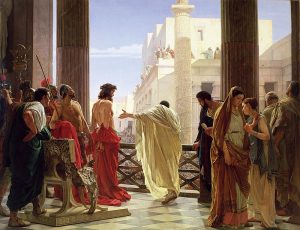Thoughts on Sunday’s Lessons for Nov. 24, 2024 (Christ the King B/Proper 29)

Ecce Homo (Behold the Man), Christ before Pilate (c. 1860-c. 1880), oil painting by Antonio Ciseri (1821-1891). Museo Cantonale d’Arte, Lugano, Switzerland. (Click image to enlarge.)
First Reading (Track One): 2 Samuel 23:1-7
The six-month-long string of Sundays after Pentecost concludes this Sunday with the feast of Christ the King – sometimes called the “Reign of Christ” to set a less patriarchal tone. This reading from the Second Book of Samuel offers a poetic passage called “The Last Words of David.” A hymn of praise, likely written in David’s memory long after his death, declares that David was God’s favorite: a just ruler, the one through whom the God of Israel speaks. God has made an everlasting covenant with David, its verses declare. It is a covenant that will bring prosperity to the king’s reign and success to all the king’s descendants.
First Reading (Track Two): Daniel 7:9-10, 13-14
It might seem a little awkward for us as Americans, remembering our nation-founding revolution against the British king, to depict our God as a monarch and Jesus as a warrior king. Yet we do just that on Christ the King Sunday as we look to the culmination of history with Christ as our king. This reading from the Book of Daniel portrays a mighty God on a fiery throne. As modern Christians, we might prefer to visualize a transcendent Creator whose very nature lies beyond our ability to imagine. For early Christians living in a time of empire, though, it must have been reassuring to imagine an all-powerful God giving dominion over all nations and peoples to “one like a human being,” who they would identify as Christ.
Psalm (Track One): Psalm 132:1-13 (14-19)
Sunday’s Psalm continues in the spirit of this week’s first reading about David and God’s covenant to bless and bring prosperity to him and to his descendants. Remembering the hardships that David endured in keeping his oath to God, the Psalmist vows not to rest until Israel builds a temple on Mount Zion, a dwelling place on earth where God can rest. If Israel’s children keep the covenant that their kingly ancestor made with God, then Israel will sit on David’s throne forever.
Psalm (Track Two): Psalm 93
God is king! God is majestic! God is powerful! How this mighty hymn must have thundered through the ancient temple, celebrating the power and the kingship of God in metaphors of sound and fury: Roaring floods and massive ocean waves thundering, calling out the glory of God our king. Unlike earthly kings, the Psalmist sings, God’s world is certain, immovable and mighty. God’s kingdom will endure, sure and holy, for ever and evermore.
Second Reading: Revelation 1:4b-8
This greeting from the first page of Revelation gives away the simple secret of this mysterious book: It is not a strange and frightening prediction of the End Times, nor does it conceal coded information about our times, or any other time or place. It was a subversive sermon for persecuted Christians in Asia Minor, carrying this simple message: God our King, who was with us at the beginning and will be with us at the end, loves us and frees us from our sins through Christ. In words that echo the Daniel reading, we hear that Jesus our Savior, God, ruler of all the kings of the earth, will come back with the clouds to deliver justice.
Gospel: John 18:33-37
Finally, in John’s Gospel, Jesus makes his kingship clear as he stands before Pilate. Or does he? Accused of declaring himself king of the Jews, an act of treason against the powerful Roman Empire, Jesus answers, clearly and firmly, “My kingdom is not of this world.” Pilate remains puzzled. Jesus stakes his claim to a kingdom and claims his kingship, but it’s “not from here,” adding that he came into the world to testify to the truth. Is he a king? “You say so,” Jesus replies to Pilate. But when and how will this kingdom come? Will it come in the future with trumpet blasts and fire and brimstone? Or do we build it every day when we act as Christ’s hands in the world?
